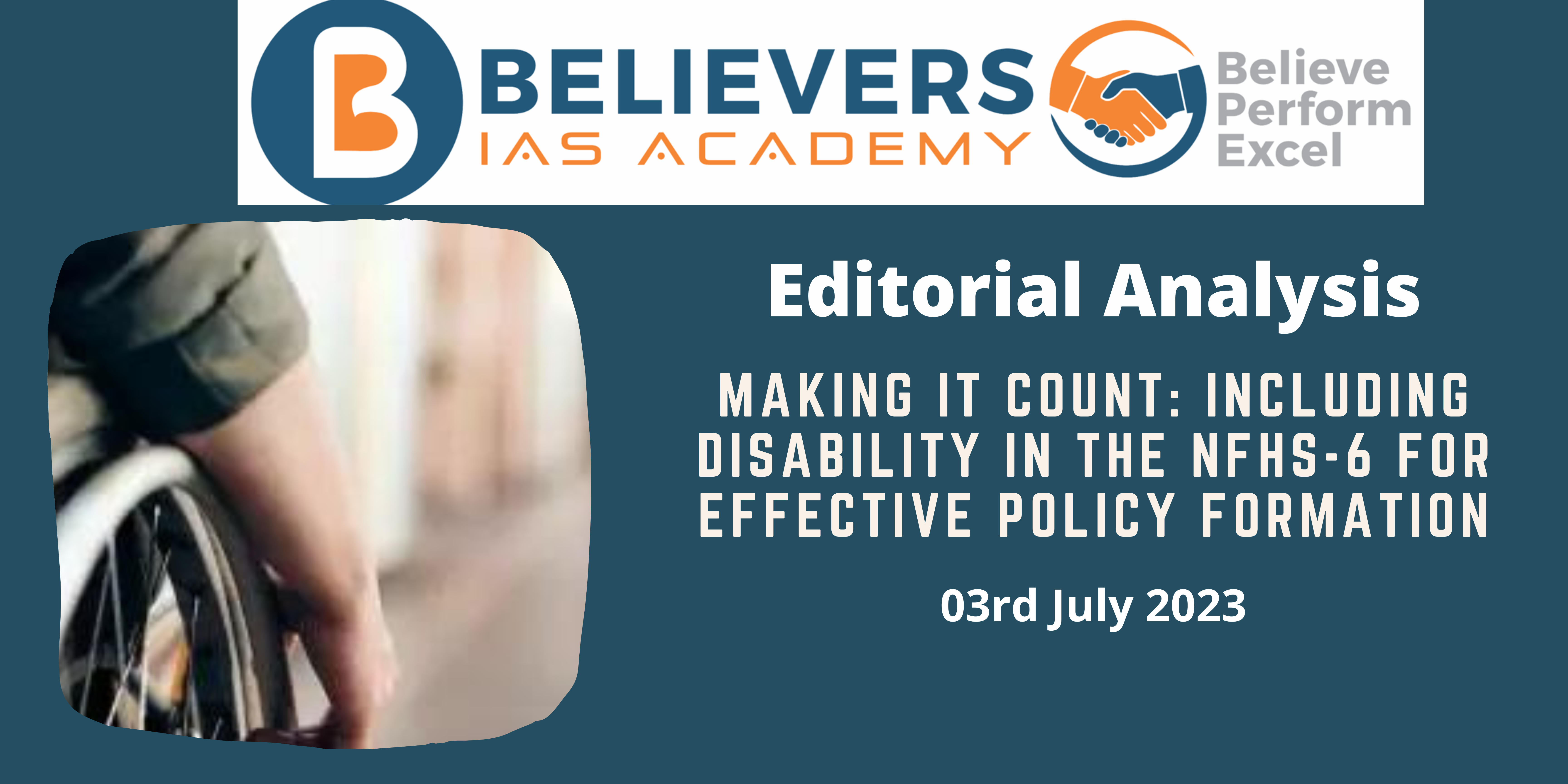Making it Count: Including Disability in the NFHS-6 for Effective Policy Formation
Context:
The recent decision of the Union government to exclude disability-specific questions from the National Family Health Survey (NFHS)-6.
Relevance:
GS-02 (Government Policies and Intervention) (Health) (Gender) (Issues relating to development)
Prelims:
- National Family Health Survey.
Mains Questions:
1. Discuss the significance of including disability-related questions in the National Family Health Survey (NFHS)-6 for informing welfare policies and addressing the needs of the disabled population.(150 words)
Dimensions of the article:
- The Need for Comprehensive Data on Disabilities
- Addressing Under-reporting and Training Field Staff
I. The Need for Comprehensive Data on Disabilities
- In order to obtain a truly representative dataset, it is crucial to rely on the extensive sampling of the NFHS, which encompasses 6.1 lakh households. While the Sample Registration Survey (SRS) captures some aspects of disability, it is the detailed questioning of the NFHS that provides invaluable insights into the lives of the disabled.
- Previously, this crucial information had been glaringly absent. The SRS primarily focuses on aspects such as disability prevalence, education levels, living arrangements, care-givers, certification, accessibility, and unemployment rates.
- On the other hand, the NFHS goes beyond these parameters to gather comprehensive data on health and nutrition status, access to healthcare schemes, insurance coverage, sexual behavior, family planning, domestic violence, household amenities, lifestyle indicators, and access to basic necessities like drinking water and sanitation facilities.
- It is evident that the inclusion of disability-related questions in the NFHS will result in more robust and nuanced data pertaining to the disability sector.
II. Addressing Under-reporting and Training Field Staff
- While some argue that the sole disability-related question in the NFHS also suffered from under-reporting, it is essential to consider the role of field staff training in accurate data collection.
- Efforts must be made by the government to enhance the training provided to field staff, equipping them with the necessary skills and sensitivity required to effectively gather information on disabilities.
- By incorporating specific questions related to disabilities and investing in proper training, there is a higher likelihood of capturing an accurate representation of the disabled population in the massive scale count of the Indian population.
Way Forward:
- Reinstate Disability-Specific Questions: The government should reconsider its decision and reinstate disability-specific questions in the NFHS-6 to ensure a comprehensive understanding of the disabled population’s needs and challenges.
- Enhance Field Staff Training: Invest in rigorous training programs for field staff involved in data collection to improve accuracy and minimize under-reporting.
- Collaborate with Disability Advocacy Groups: Foster partnerships with disability advocacy groups to gain insights and guidance on designing appropriate survey questions and methodologies.
Conclusion:
Inclusion of disability-related questions in the NFHS-6 is crucial for the government to fulfill its commitment towards the welfare of the disabled population. The NFHS, with its extensive sampling and comprehensive set of questions, provides an opportunity to gather valuable insights into the lives and requirements of the disabled. By rectifying the decision to exclude these questions, ensuring proper training for field staff, and collaborating with disability advocacy groups, the government can obtain accurate data that will enable evidence-based policy formulation and better allocation of resources. It is imperative that the government prioritizes the inclusion of the disabled population in its data-driven initiatives, thereby creating a more inclusive and equitable society for all.




